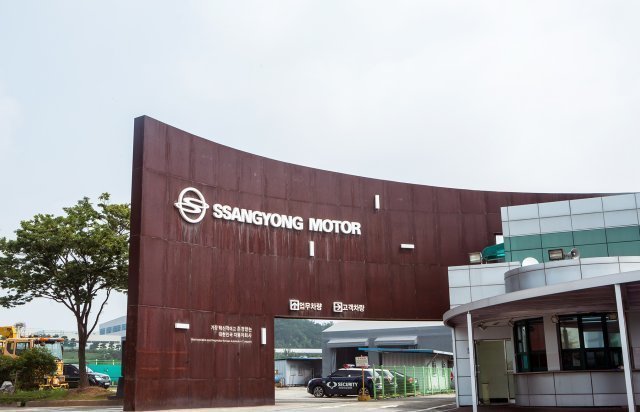Underwear maker shares jump on bid to acquire SsangYong Motor
Timely resolution unlikely as SsangYong creditor KDB caught in relocation push
By Choi Si-youngPublished : April 1, 2022 - 15:49

Shares of underwear maker Ssangbangwool rose about 29 percent Friday, as the company announced its bid to acquire SsangYong Motor, a debt-ridden carmaker whose recent takeover by a local electric carmaker fell apart.
The company’s shares closed at 1,010 won ($0.83), up 29 percent from Thursday’s closing on the benchmark Kospi board. Ssangbangwool’s key subsidiary Kanglim, which trades on the junior Kosdaq, saw its shares rise by 30 percent. Kanglim manufactures special vehicles like firetrucks and cranes.
The underwear maker said it had already signed a letter of intent, adding that Kanglim will lead a consortium to seal what many say could be a 1 trillion won deal to take over SsangYong, which has been under court receivership since April last year.
SsangYong is owned by Indian automaker Mahindra & Mahindra, which bought the majority stake in 2010 when the Korean firm was nearly bankrupt. Considering SsangYong being liquidated, the Indian automaker is looking for a buyer to take all or most of its stake. Mahindra owns about 75 percent of SsangYong’s shares.
Speculation is mounting over whether Korea Development Bank, SsangYong’s biggest creditor, would greenlight the deal this time, given that the state-run bank had refused the initial deal electric carmaker Edison Motors proposed. The deal was rejected as it involved leveraged loans, or borrowed money, to purchase SsangYong.
But a quick decision is unlikely, according to a source with knowledge of the matter. The bank will have to deal with President-elect Yoon Suk-yeol’s push to relocate the KDB headquarters from Seoul to Busan.
As the move involves relocating the organization 400 kilometers away from the capital, it could potentially trigger a brain drain, the source said. Currently, Korea’s major financial services companies operate in Yeouido, western Seoul.
“But the acquisition would not be put off indefinitely either, as we cannot repeat the same fiasco earlier,” the source said, referring to the bank’s thwarted attempt in January to merge Hyundai Heavy Industries and Daewoo Shipbuilding & Marine Engineering. KDB is also DSME’s largest shareholder.
The merger, which would have created the world’s biggest shipbuilder, was vetoed by the European Commission over monopoly concerns. Critics here had already floated such concerns when KDB was working on the merger.
“We have to show that our actions are not dictated by decisions that the EU makes,” Chairman and CEO Lee Dong-gull told a press conference in late January. “I hope Hyundai Heavy Industries files a complaint forcefully against the decision.”
The company’s shares closed at 1,010 won ($0.83), up 29 percent from Thursday’s closing on the benchmark Kospi board. Ssangbangwool’s key subsidiary Kanglim, which trades on the junior Kosdaq, saw its shares rise by 30 percent. Kanglim manufactures special vehicles like firetrucks and cranes.
The underwear maker said it had already signed a letter of intent, adding that Kanglim will lead a consortium to seal what many say could be a 1 trillion won deal to take over SsangYong, which has been under court receivership since April last year.
SsangYong is owned by Indian automaker Mahindra & Mahindra, which bought the majority stake in 2010 when the Korean firm was nearly bankrupt. Considering SsangYong being liquidated, the Indian automaker is looking for a buyer to take all or most of its stake. Mahindra owns about 75 percent of SsangYong’s shares.
Speculation is mounting over whether Korea Development Bank, SsangYong’s biggest creditor, would greenlight the deal this time, given that the state-run bank had refused the initial deal electric carmaker Edison Motors proposed. The deal was rejected as it involved leveraged loans, or borrowed money, to purchase SsangYong.
But a quick decision is unlikely, according to a source with knowledge of the matter. The bank will have to deal with President-elect Yoon Suk-yeol’s push to relocate the KDB headquarters from Seoul to Busan.
As the move involves relocating the organization 400 kilometers away from the capital, it could potentially trigger a brain drain, the source said. Currently, Korea’s major financial services companies operate in Yeouido, western Seoul.
“But the acquisition would not be put off indefinitely either, as we cannot repeat the same fiasco earlier,” the source said, referring to the bank’s thwarted attempt in January to merge Hyundai Heavy Industries and Daewoo Shipbuilding & Marine Engineering. KDB is also DSME’s largest shareholder.
The merger, which would have created the world’s biggest shipbuilder, was vetoed by the European Commission over monopoly concerns. Critics here had already floated such concerns when KDB was working on the merger.
“We have to show that our actions are not dictated by decisions that the EU makes,” Chairman and CEO Lee Dong-gull told a press conference in late January. “I hope Hyundai Heavy Industries files a complaint forcefully against the decision.”
-
Articles by Choi Si-young








![[KH Explains] How should Korea adjust its trade defenses against Chinese EVs?](http://res.heraldm.com/phpwas/restmb_idxmake.php?idx=644&simg=/content/image/2024/04/15/20240415050562_0.jpg&u=20240415144419)











![[Today’s K-pop] Stray Kids to return soon: report](http://res.heraldm.com/phpwas/restmb_idxmake.php?idx=642&simg=/content/image/2024/04/16/20240416050713_0.jpg&u=)